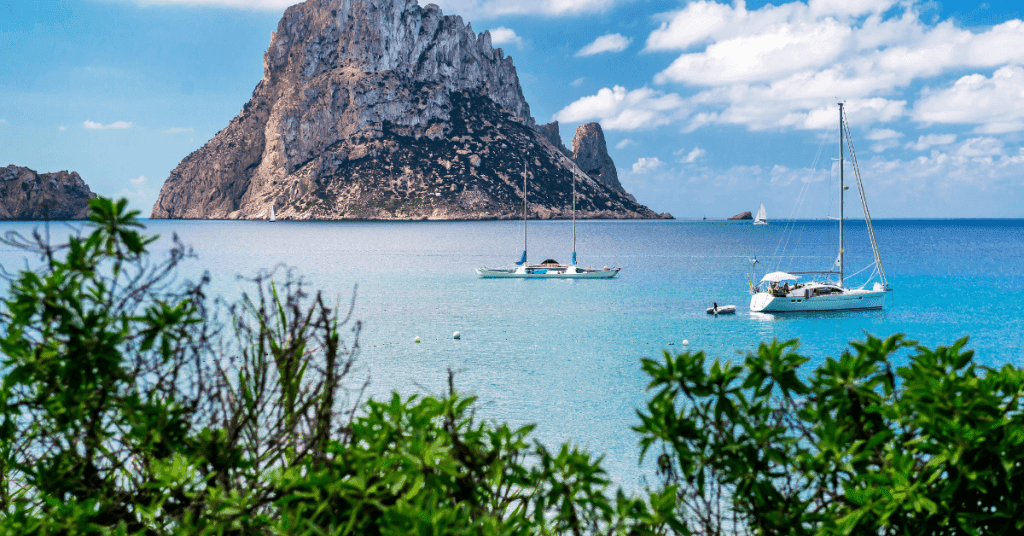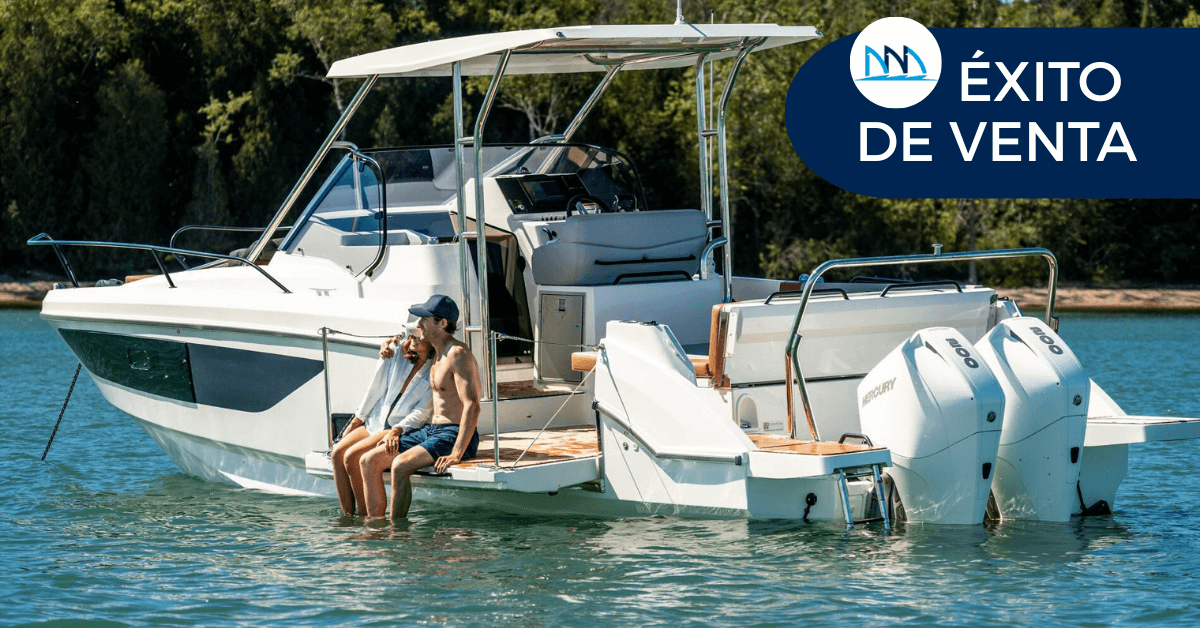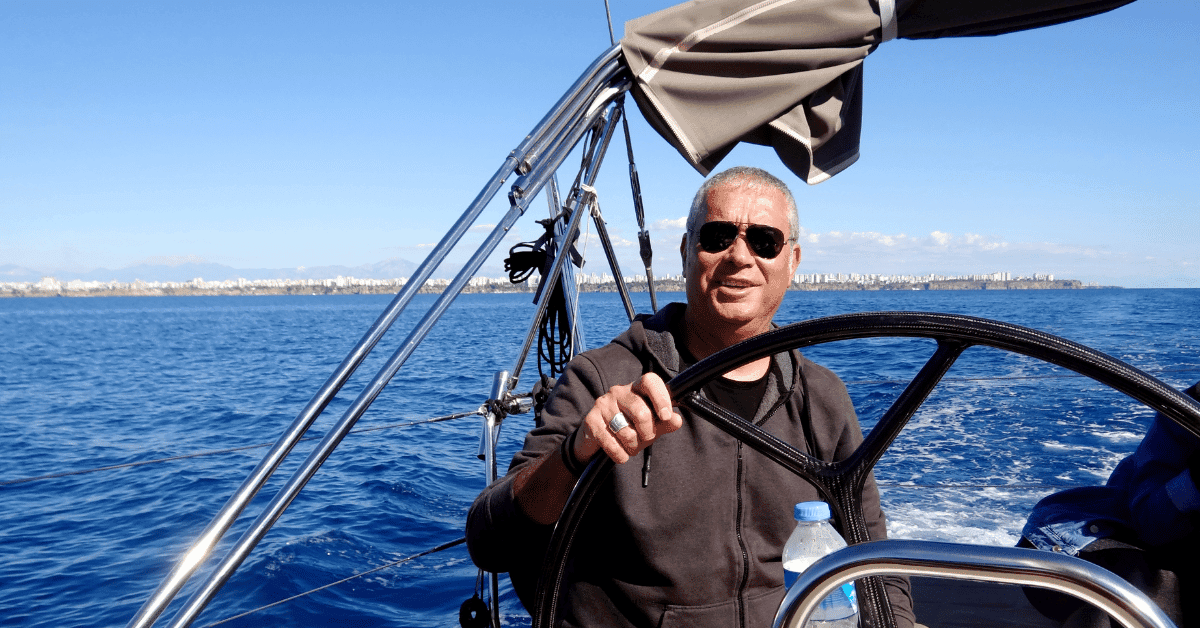From Barcelona to Ibiza on your own boat
Why choose a boat trip from Barcelona to Ibiza?
Immerse yourself in a unique experience of freedom and adventure as you sail the Mediterranean Sea. Leave behind the limitations of schedules and pre-established routes and discover the thrill of being the captain of your own voyage.
Enjoy the flexibility to explore the most beautiful coasts and islands of the Mediterranean at your own pace. Every day will be a new opportunity to discover hidden coves, white sandy beaches and charming coastal villages.
Experience unforgettable moments at sea, contemplating the breathtaking panoramic views of the horizon, feeling the sea breeze on your face and immersing yourself in the serenity and tranquility that only the ocean can provide.
Benefits of organizing your own trip with your own boat
- Freedom and flexibility: Organizing your own sailing trip gives you the freedom to decide when to set sail, how long to spend at each destination and which places to visit along the way. You will not be limited by pre-established schedules and itineraries.
- Privacy and exclusivity: Enjoy the company of your loved ones in an intimate and private atmosphere. You will not have to worry about sharing spaces with other tourists and you will be able to enjoy special moments on board.
- Personalized experience: By organizing your own trip on your own boat, you can adapt it to your personal preferences and tastes. You can choose the activities that interest you most, explore lesser-known places and design a unique tailor-made experience.
- Adventure and discovery: Sailing your own boat gives you the opportunity to explore remote and authentic places. Discover secret coves, unspoiled beaches and charming coastal villages that are only accessible by boat.
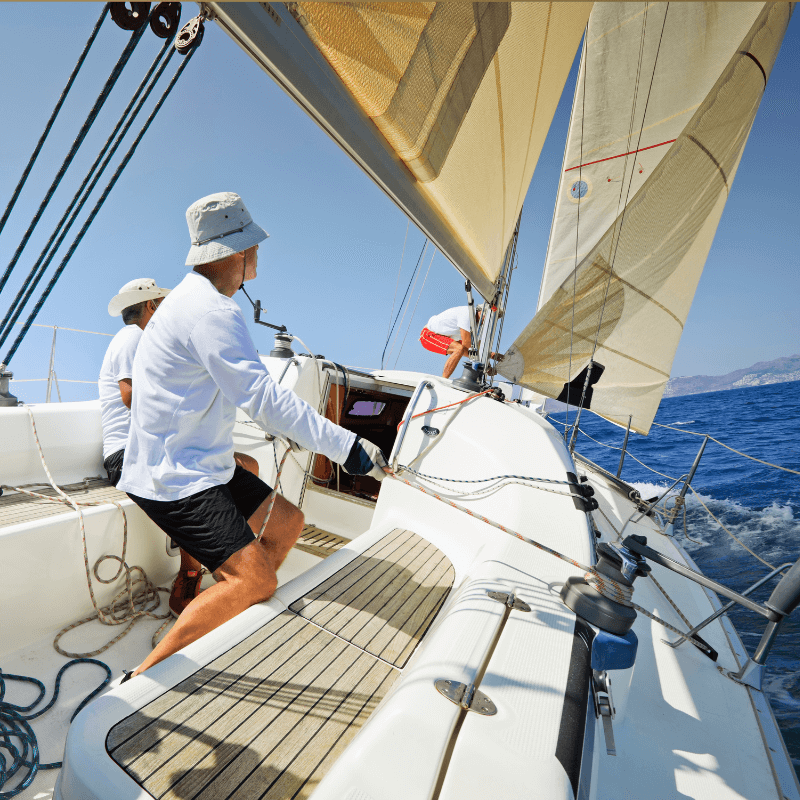
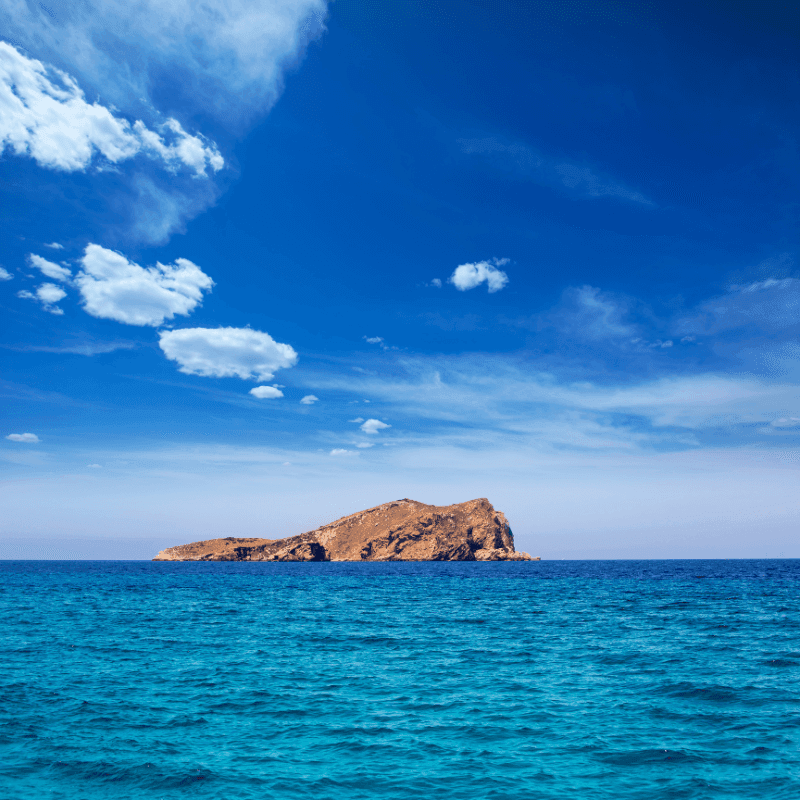
Preparing for the trip
- Considerations when choosing a boat for the trip: Evaluate the size, capacity, amenities and performance of the boat based on your needs and those of your group. Do you prefer a classic sailing yacht, a modern catamaran or a luxury motor yacht?
- Types of boats available: Research the different options available in terms of size, features and amenities. Evaluate which one best suits your preferences and budget.
- Factors to consider when buying a boat: Check the reputation and reviews of the boat sales company. Verify the age and maintenance of the vessel. You can consult our article:
TIPS FOR BUYING A SECOND-HAND BOAT
B. Documentation and requirements
- Documents required to sail from Barcelona to Ibiza: Make sure you have the identity documents of all passengers, including valid passports or ID cards.
- Permits and licenses required: Verify the legal requirements and licenses needed to navigate safely. This may include the navigation permit, certificate of competency and compulsory insurance.
- Maritime rules and regulations to be taken into account: Find out about local regulations, restricted navigation zones and maritime safety rules in force. It complies with all regulations to ensure a safe and smooth crossing.
C. Itinerary planning
Determine the duration of the trip
: Determine the total duration of the trip and take into account weather conditions, navigation speed and planned stops.
Places of interest on the way from Barcelona to Ibiza: Research the destinations and places of interest you wish to visit along the way. You can include stops at beautiful coves, paradisiacal beaches or picturesque coastal villages.
Establish strategic stops and anchorages: Plan overnight and rest stops, making sure that ports, marinas or anchorages are available at each destination. Consider the services and facilities you will need during your trip.
Marinas in Ibiza:
D. Provision and supply
Ship’s provisioning checklist:
Make a detailed list of supplies needed for the trip, including food, water, fuel, hygiene products, and basic cooking utensils.
Food and beverages necessary for the trip: Plan your meals and make sure you have enough food and drink for all days of sailing. Consider options that are easy to store and prepare on board.
Recommendations for offshore supply: Find out the availability of stores, supermarkets or provisioning services at the ports of departure and arrival, as well as at intermediate stops. Make sure you have enough supplies for the entire trip.
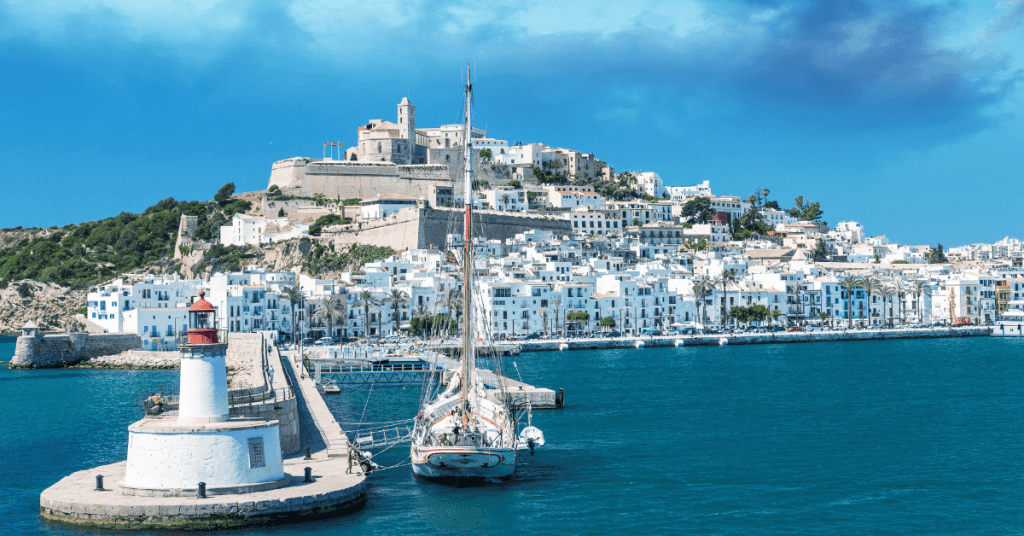
Safety and navigation
A. Basic knowledge of navigation
- Basic principles of marine navigation: Become familiar with basic navigation concepts, such as the use of nautical charts, the interpretation of symbols and marks on the water, and the use of the compass and GPS.
- Nautical chart reading and compass use: Learn to read and understand nautical charts, which provide essential information on depths, obstacles, buoys and navigation channels. Practice using the compass to determine your course and orientation at sea.
- Interpretation of maritime signals: Learn how to interpret maritime signals, both visual and audible. This includes buoys, beacons, navigation lights and navigation signals in harbors and canals.
B. Safety on board
- Mandatory safety equipment on the boat: Verify that your boat has the safety equipment required by maritime legislation. This includes life jackets, life rings, fire extinguishers, flares, flotation devices and a complete first aid kit.
- Tips to prevent accidents and injuries on your boat: Establish clear safety rules on board and make sure all passengers know and follow them. Avoid walking barefoot, keep walkways clear and use caution when moving around the ship.
- Emergency procedures and first aid: Familiarize yourself with the emergency procedures on board and make sure that all passengers know how to act in case of an emergency situation. Carry a complete and up-to-date first aid kit.
C. Communication on the high seas
Make sure you have the necessary means of communication on board, such as a VHF radio, a cell phone with sea coverage and, if possible, a satellite communication system.
Maritime communication protocols:
Learn and become familiar with maritime communication protocols and codes, such as the use of radio channels, distress calls and safety communications.
Use of VHF radio and other communication devices:
Learn how to use your VHF radio correctly and keep it in good working order. Make sure you know the emergency channels and procedures for requesting help in case of need.
D. Weather conditions and forecasts
Learn how to interpret marine weather reports and understand the terms and symbols used. Pay attention to factors such as wind speed and direction, sea state and storm predictions.
Dealing with adverse weather conditions:
Anticipate and prepare for adverse weather conditions. Have a plan of action in case of strong winds, storm surges or storms. Always prioritize safety and consider delaying or adjusting your itinerary if conditions are unfavorable.
Recommendations for safe navigation:
Stay informed about weather conditions and weather updates along your route. Consult reliable sources and maintain contact with other mariners or port authorities for up-to-date information and additional advice.
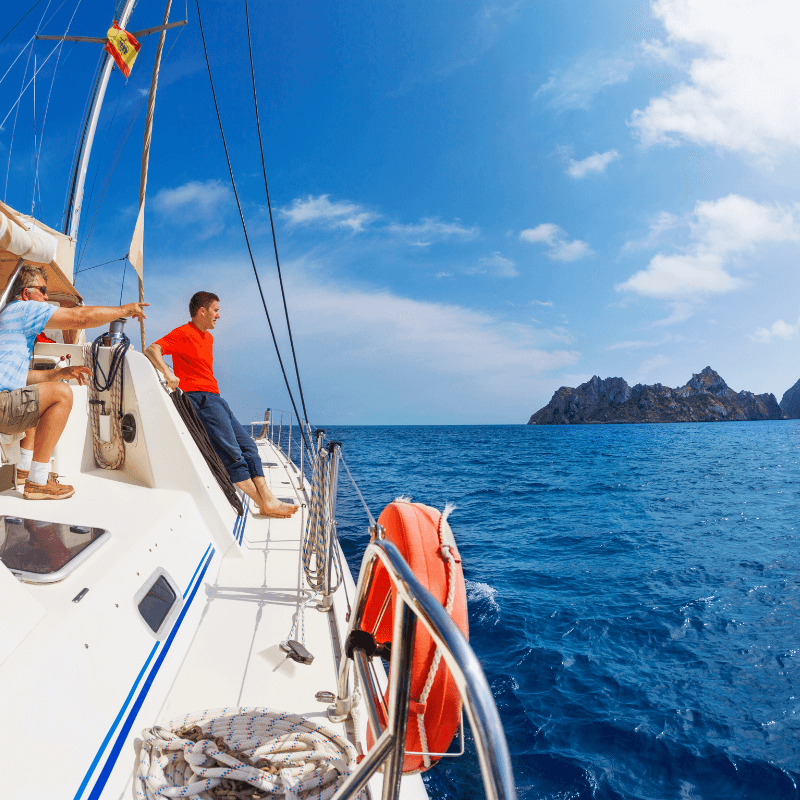
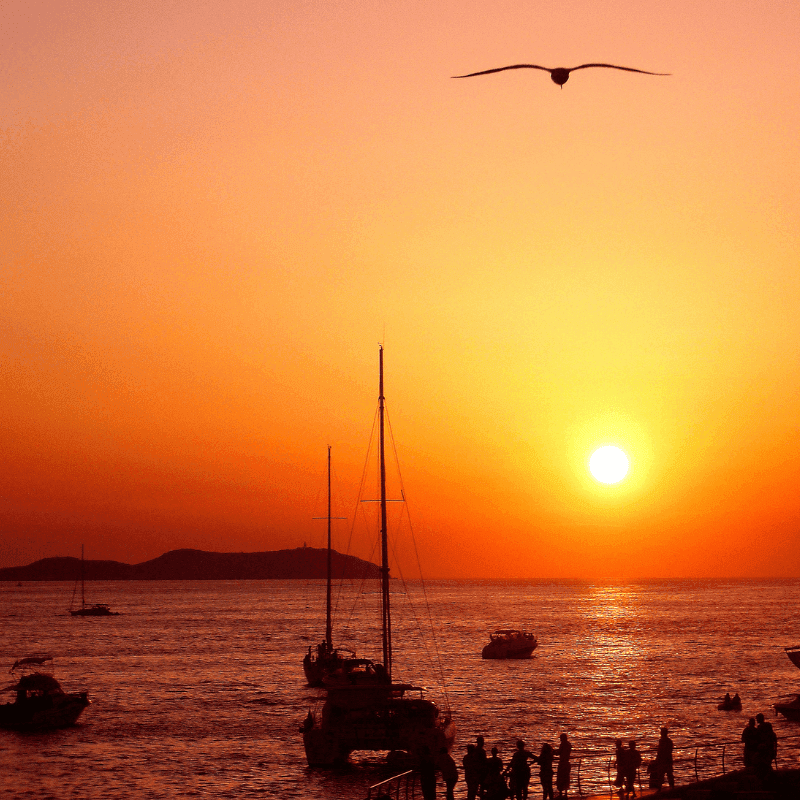
Onboard experience and entertainment
A. Activities and entertainment
-
Entertainment options during the boat trip:
Prepare board games, cards, books, musical instruments or movies to entertain on board. Organize group activities such as fishing, swimming or just relax on deck and enjoy the scenery. -
Water sports and recreational activities:
Bring equipment for water sports such as paddle surfing, kayaking, water skiing or snorkeling. These sports are ideal for enjoying the crystal clear waters and exploring the marine life in coves and bays. -
Games and ways to keep busy on board:
It organizes fishing competitions, card tournaments or board games. You can also bring binoculars for bird watching and enjoy the beauty of nature during the trip.
B. Gastronomy and cuisine on board the ship
-
Easy and delicious recipes to prepare on the boat:
Plan simple but tasty meals that you can easily prepare in the limited space of the ship's galley. Opt for dishes that require fresh and easily preserved ingredients. -
Tips for cooking in a limited space:
Make the best use of galley space and use cooking utensils and equipment suitable for the vessel. Consider simple cooking options, such as grilling or broiling, that do not require a lot of space or preparation time. -
Unique culinary experiences during the trip:
Take the opportunity to taste fresh local products in the ports you visit. Explore local markets and buy fresh fish, seafood or regional products to add a special touch to your meals on board.
C. Discovering marine life
How to get the most out of the sailing experience:
Keep your eyes open and enjoy the experience of sailing at sea. Observe marine life, such as dolphins and seabirds, while sailing and take advantage of the moments to connect with nature.
Sightings of dolphins and other marine species:
Find out about the areas where dolphins and other marine species are most likely to be sighted on your route. Keep your camera ready to capture those magical moments and enjoy the beauty of marine life in its natural habitat.
Diving and snorkeling activities in Ibiza:
Enjoy the underwater richness of
Ibiza
. Explore stunning coral reefs, discover tropical fish and dive into crystal clear waters to explore the diversity and beauty of the underwater world.
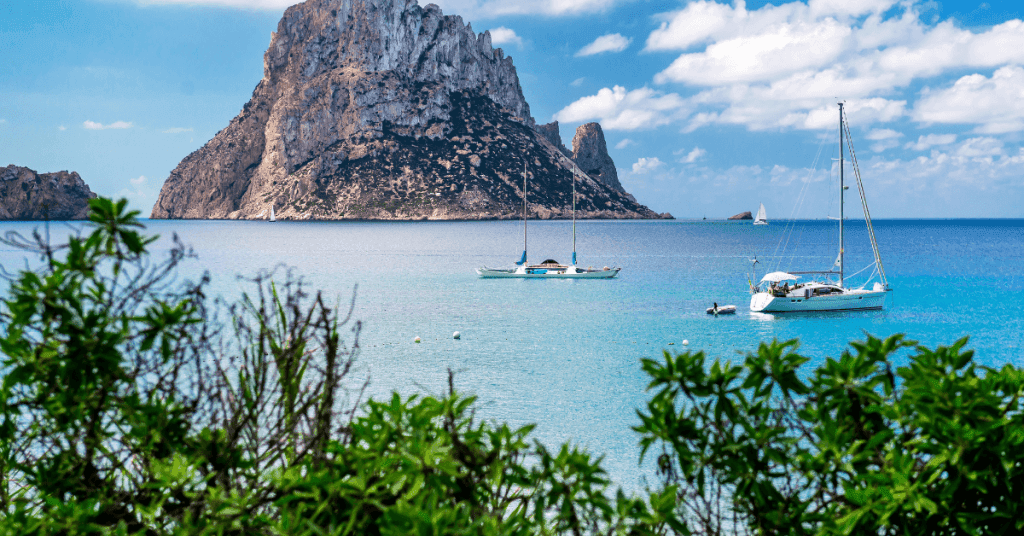
Frequently Asked Questions
It is not essential to have previous sailing experience, but it is recommended to have basic knowledge of maritime navigation and safety. If you are inexperienced, consider hiring the services of an experienced skipper to assist you during the trip.
Sailing time from Barcelona to Ibiza may vary depending on weather conditions and the type of boat you choose. Generally, the crossing can take between 8 and 12 hours, but it is important to plan according to the conditions and the estimated sailing speed.
To sail from Barcelona to Ibiza, we recommend a sailboat or a catamaran. These boats are ideal for offshore cruises, offer comfort and stability, and allow you to enjoy a more authentic and closer to the sea experience.
The costs associated with a boat trip from Barcelona to Ibiza can vary according to different factors, such as the type of boat, the duration of the trip, the services included and the necessary provisions. Some of the costs to consider are:
Fuel: Fuel consumption will depend on the distance and speed of navigation. Calculate the estimated fuel consumption and take into account current prices to budget for this item.
Port charges: Some ports may charge fees for mooring or use of their facilities. Research the ports of departure and arrival, as well as intermediate stops, to get an idea of possible port charges.
Provisions: Considers the costs of providing food, beverages and supplies for the trip. Compare prices at local supermarkets and nautical supply stores to get the best prices and quality options.
Insurance: Make sure you have adequate insurance for the boat and passengers. Check the coverages included and the additional options available.
Extras and activities: If you plan to participate in additional activities, such as guided excursions, water sports equipment rental or sightseeing, consider these additional expenses in your budget.
Remember that it is important to plan and establish an adequate budget to ensure that you have the financial resources necessary to enjoy your sailing trip without worries.
Summary
In short, organizing a boat trip from Barcelona to Ibiza is an exciting and unique experience that gives you freedom, flexibility and the opportunity to discover beautiful landscapes and authentic places in the Mediterranean Sea. With good planning, attention to safety and an adventurous attitude, you can enjoy an unforgettable trip.
From choosing the right boat to preparing the itinerary, safety on board, entertainment and exploring marine life, every aspect of your trip must be considered and taken care of.
Don’t miss the opportunity to live this incredible adventure sailing your own boat from Barcelona to Ibiza!


